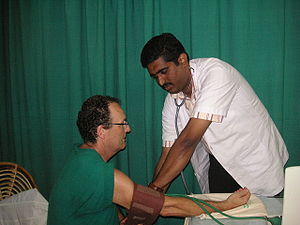Provenance of Ayurveda

Image via Wikipedia
Ayurveda is an ancient Indian method of healing, a philosophy and a way of life. Medically it has roots from science and folk wisdom. It is believed to be originated from the creator of the world. The Hindu deity Lord Dhanwanthari, an incarnation of Lord Vishnu is regarded as the god of Ayurveda. The source of Ayurveda cannot be traced, nor its date of origin.
No one has claimed as the authors of Ayurveda, even the founding fathers. As Charaka states, he has only edited the work of Agnivesha who was orally given instruction by the sage Atreya. Sushrutha presents the text as the teachings of his teacher, King Dhanvantri. All the texts that are presently available are either the edition of Charakasamhitha by Dhridabala or Nagarjuna’s revised work of Susruthasamhitha. These works presents detailed indications of medical knowledge and practices existed in ancient India for Charaka and Susrutha to draw upon. Kasyapa, Bhela and Vagbhata are the other great names in Ayurveda. Hardly anything is known about Kasyapa and Bhela. Their names are associated with, Kasyapasamhita and Bhelasamhita, which are only available in fragments. Though Ashtangahridayam of Vagbhata is a widely popular text. Vaghbata is believed to have lived in or after AD 5.
A recent study has revealed that Americans only use about 26 percent of their lung capacity while breathing. In a technique called Pranayam or the science of breathing enables in a variety of ways to channel the power of breathing in a powerful manner. Ayurveda teaches us about the right way of breathing and taking complete breaths and there by fostering the body. Ayurveda also merges with Yoga which is a correlative science that has many body postures for each and every body part.
Ayurvedic way healing is exemplary. It has exact perception of nutrition that decides the optimum foods to have in the right time and at the right state of mind for smooth digestion. Moreover Ayurveda heals by integrating herbs and herbal combinations. Ayurveda has also healing processes with many natural oils.
Dravidian and pre-Dravidian societies.possessed their own native tradition of medicine before the arrival of Sanskrit texts. Mannan, Ezhava, and Velan were the casts that were noticeable in the filed of medicine.Ezhavas practiced what can be called general medicine, Mannans and Velans were experts in pregnancy -related ailments. and diseases affecting children. There were also specialist practitioners for treating snakebites and other poison -related illnesses.
In a text called Sahasrayogam there are medicines and formulations unknown or untested in the ayurveda samhitas. Njavarakizhi, pizhichil and dhara are part of the tradition in which a whole science of treatment using different methods was developed .Abhyangam or oil massage was used for medical treatment and with some difference in the training of warriors and Kathakali (ancient Kerala dance form) dancers.
Ayurveda samhitas arrived Kerala with the spread of Buddhism and Jainism between 5 and 7 century AD.The influence of the samhitas and their prominence were increased with the growth of Namboothiri (Brahmin) settlements. These settlements had at least one house that mastered Ayurveda. The last ashtavaidyan family are called Nambi and the others are called Moos.The Namboothiri physicians use Vagbhata’s Ashtangahridayam as the elementary text unlike the Brahmins in north India in spite of its Buddhist philosophical implications.
The spread of Sanskrit among the non -Brahmin castes by the 14th century made it possible for others to read and master the contents of the Ayurveda Samhitas. Pioneers in this were the Variers, a caste that performed specific duties in temples. Variers are always closely associated with the temples which were the hub of learning. This meant that they became experts in Sanskrit and hence the samhitas. Thus the Kerala Ayurvedic system is an amalgamation of Samhithas and the native medical tradition.
For ordering online Herbal supplements such as, Gandha tailam , Sallaki 600, Sallaki 400
Dasamoolarishtam, Maharasnadi qwath, Balarishtam. Visit ayurvedaforall.com
Related posts:
- Destinations for Ayurvedic Treatments in India medianet_width='300'; medianet_height= '250'; medianet_crid='432485586'; Ayurveda means a holistic healing science that is originated from two Sanskrit words, Ayu and Veda. Ayu means life and Veda means knowledge or science, hence it is a Science of Life. Unlike other treatments Ayurveda not just deals with the treatment of some diseases. It...
- What are the advantages of Ayurvedic Treatment? Ayurvedic treatment is the oldest method of holistic healing to man as it originated a long time ago in our country. The word Ayurveda is a Sanskrit word: Ayu means life and veda means knowledge. This knowledge of life is the way to chording our body and feel, which raises...
- Ancient Ayurvedic treatment Ayurvedic medicines has been a real basic practice of the native Indians who still believe in the Ayurvedic form of treatment and deals all the wellness related issues in a natural Ayurvedic way. Most of the Ayurvedic treatments were handed down by word of mouth before writing was contrived and...
- What are the advantages of ayurvedic herbs ? Ayurvedic herbs are extremely good to the overall healthy working of the human body. Whatever malady affects people down, it attains feel that they could attempt to follow a less formal course of treatment, and one that may drift from the bunked path of Western medicine. A boniface of ailments...
- Healing naturally with Herbal Medicines Plants has medicinal properties that can be used for healing purposes. Herbal medicine is generally based on the use of plants and its extracts. Millions of people have been using natural ways of healing or curing their ailments. Before going for herbal medicine one should know that there can be...